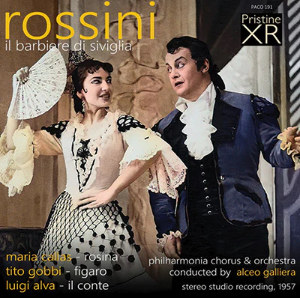
Gioachino Rossini (1792–1868)
Il barbiere di Siviglia (1816)
Maria Callas (soprano) – Rosina; Luigi Alva (tenor) – Il conte d’Almaviva; Tito Gobbi (baritone) – Figaro; Fritz Ollendorff (bass) – Bartolo; Nicola Zaccaria (bass) – Basilio; Gabriella Carturan (mezzo) – Berta; Mario Carlin (tenor) – Fiorello
Philharmonia Orchestra and Chorus/Alceo Galliera
rec. 1957, Kingsway Hall, London
Ambient Stereo
PRISTINE AUDIO PACO191 [2 CDs: 130]
This recording, originally made by EMI and reprocessed by Pristine Audio, has historic importance as the first full opera recording made in stereo with the talents of the late, great Maria Callas. Still in relatively good voice, Callas had the misfortune to be grossly underused by EMI during the 1950s. Even when she did record full operas in the studio, they were often severely cut versions. Only too late did EMI realize that Callas would be a tremendous source of income for them for many decades to come. Rather than the roles that made her a star, such as Verdi’s Macbeth, EMI was content to use Callas to fill holes in its opera catalogue. As a result, Callas was dropped into the role of Rosina, which she had previously sung the year before at La Scala with the same principal singers, but it had not been a great success (review).
The results of the recording are surprisingly good. Tito Gobbi makes a suitably boisterous Figaro, and he delivers Figaro’s patter at a head-spinning tempo. Callas and Gobbi are at their best in Act I as they are scheming against Don Bartolo. Luigi Alva is a decent Count Almaviva, with a rather lightweight vocal timbre that contrasts well with bass Fritz Ollendorff’s Bartolo. Conductor Alceo Galliera had a firm understanding of Rossini, emphasizing the froth and fun, with moments of seriousness (but not too serious) such as the storm scene.
Callas is of course the main attraction here. Even though Rosina is not a bel canto role that would be her forte, she still brings all of her skills as a vocal actress to bear. In her big aria, Una voce poco fá, she is by turns (sometimes within the same line) smitten in love, spiteful, scheming, and amused. She practically spits venom on the phrase, “vecchio maledetto.” Her performance has been referred to as a “vocal caricature,” but I’d call it a thoughtful and detailed interpretation based on the libretto. Callas is of course a love-her-or-hate-her proposition (full disclosure: I am in the former camp), but she recognizes that she is not really the star of the show here. This opera is an ensemble piece and she refrains from excessive vocal fireworks.
I have compared the Pristine version with the most recent remastered release in the big Warner box set of Callas’ studio recordings from a few years ago. Intellectually, I don’t think I should approve of Pristine’s rather interventionist remasters of classic recordings, but it’s impossible to argue with the results. Whereas the Warner disc might as well be mono, since virtually all of the sound is anchored firmly in the center with very little spread, Pristine injects a good deal of air into the sound, spacing out the soundstage without resorting to distracting panning. It sounds quite natural and impressively lifelike. I frankly was startled when I heard the Pristine for the first time, it sounded so immediate.
Pristine also cleans up the recording significantly. The audible tape hiss of the Warner discs is greatly reduced, without harming the timbre of the higher instruments. The low electronic hum audible on some tracks of the original (especially the opening number) is completely banished. There’s also a better sound balance on the Pristine version; on occasion the orchestra swamps the chorus on the Warner version, but the choir is plainly audible here. The Warner set also seems to have an overemphasis on bass that is occasionally distracting. Pristine restores that to a more pleasant proportion. Best of all, nearly all of the annoying audible splice sounds have vanished, thanks to the cleaned-up audio tracks. I can’t be sure, but I suspect Pristine has added a smidge of reverb, since Gobbi’s voice in particular seems to have more depth on their recording.
Both sets of course suffer from the severe cuts common in the day. Other than the two most famous arias, most numbers have something cut from them. Several recitatives vanish altogether, as does most of the second act finale.
The improvements are not enormous, but they are significant enough that anyone who owns the Warner version should seriously consider an upgrade to the Pristine set. Pristine provide downloadable documentation in PDF format, which includes a full Italian orchestral score, a vocal score in Italian and English, and a copy of the libretto in the original Italian with English translation.
Mark S. Zimmer
Previous review: Ralph Moore
Availability: Pristine Classical

















